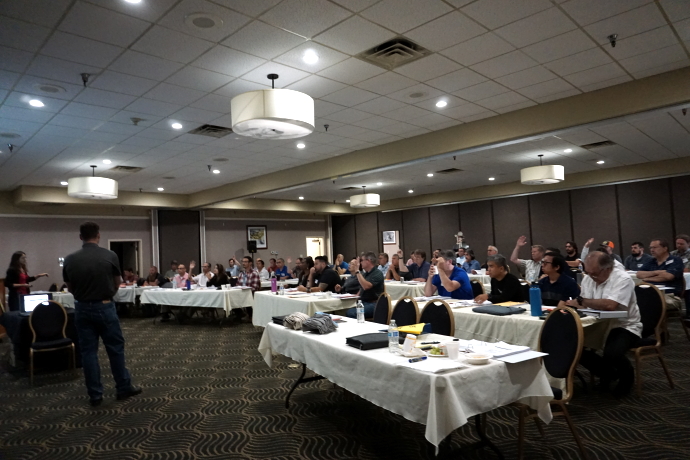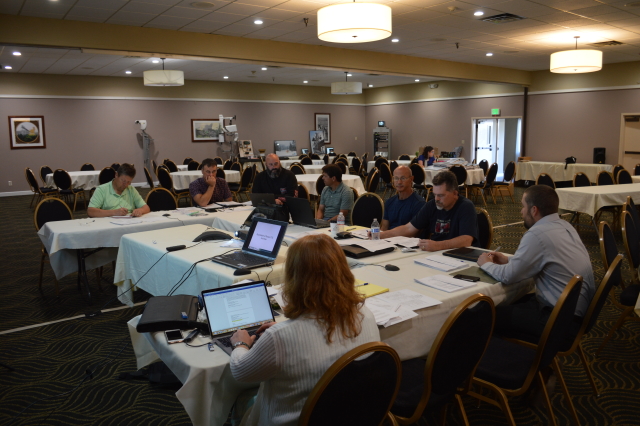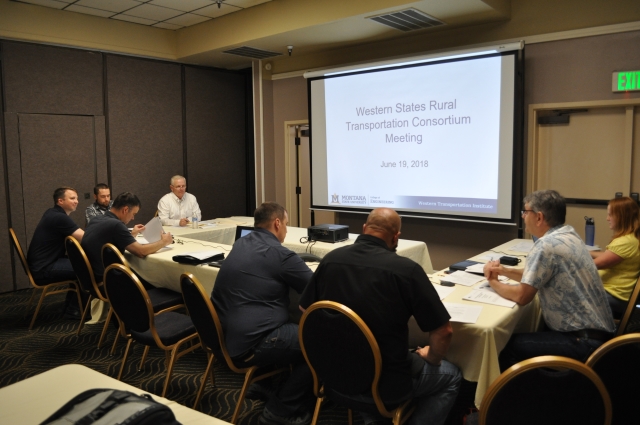UPDATE: Monday, April 27th, 2020
The project team recently completed Phase VII of the long-running COATS project. The primary goal of this phase was to build on the success of earlier COATS phases to preserve and expand the COATS region as an innovator in rural ITS demonstration. Project activities centered on technology transfer, specifically the growth and continuation of the annual Western States Forum, development of a Forum Handbook, and website maintenance and development. You can review the project’s final report here or on the COATS Phase 7 Documents page.
The COATS Phase 7 work plan had five tasks including Project Technical Advisory Panel (PTAP) meetings, the Western States Forum, and incubator projects.
The Western States Forum continued to act as a dynamic technology transfer platform.

Photo by: Doug Galarus
COATS Phase 7 supported the 2017, 2018, and 2019 Forums, and a portion of the 2020 event as well. Take a look at the technical agendas for each event – the Forum stands out by hosting detailed, informative technical presentations and demonstrations that describe the ‘nuts and bolts’ of actual rural ITS solutions. Speakers share successes, problems, and failures so participants learn what does and does not work and why. The Forum’s growth and success is shown in its participation record. Starting with 15 in 2006, the 2019 Forum saw a record 53 participants. In 2017, 48 individuals attended, with 46 participating in 2018. A record 17 abstracts were submitted for the 2020 Forum, with the Forum continuing to attract a diverse audience from within the WSRTC and surrounding region. Participants have come from ten western and central states – California, Idaho, Montana, Nevada, Oregon, Texas, Utah, Washington, Wisconsin, and Wyoming – with Wisconsin being a new addition to the list of participant states. They represented ten of the 12 Caltrans Districts, several offices and divisions within Caltrans, five universities, a city transportation office, the California Department of Water Resources, the FHWA, the Idaho National Laboratory, the Southwest Research Institute, IBM, and Civil Science.
One of the unique aspects of the Forum that enhances technology transfer is that questions and discussion are encouraged throughout a presentation, not just at the end. In this photo from the 2019 Forum, several hands are raised with questions for Oregon DOT speakers Doug Spencer and Julie Kentosh.

Photo by: Leann Koon
In addition to the technology transfer completed by the Forum, COATS/WSRTC PTAP meetings also provided an opportunity for discussion of current and future ITS activities in the region. Stakeholders also met and guided planning and decision-making related to the COATS project. Annual PTAP meetings were held in Yreka, California, in conjunction with the Western States Forum. The group met in spring 2018 in conjunction with the biennial Northwest Transportation Conference (NWTC) and again that fall during the National Rural ITS Conference + Exhibit in Fort McDowell, Arizona. WSRTC members also gathered at the ITE Annual Meeting + Exhibit (Rural ITS Track) in summer 2019 in Austin, Texas. Read more about these PTAP meetings in the following updates:
- WSRTC: Consortium Leaders Meet for Annual Meeting Held in Yreka, CA (October 26, 2017)
- WSRTC: Steering Committee Meets at Northwest Transportation Conference (May 10, 2018)
- WSRTC: Annual Steering Committee Meeting (December 12, 2018)
- WSRTC: Consortium Meets for Annual Meeting (October 24, 2019)


Photos by Doug Galarus
Because of continued interest in collaboration and sharing research results, Caltrans determined that one of the best approaches for examining rural transportation issues was to pursue incubator projects under the scope of the COATS effort. Incubator projects are low-cost research efforts (e.g., limited time, scope, monetary resources) that investigate current rural ITS challenges and technology needs. Three incubator projects were initially proposed for work under this project phase and you can read more about them on the COATS Phase 7 project page.
However, since the start of the project, significant staffing changes occurred at the Western Transportation Institute leaving staffing levels substantially reduced. To address the changes, Caltrans’ needs, and team member experience, the following incubator projects were then proposed.
Traveler Information Data Quality
The original goal for this incubator project was to develop a set of best practices for traveler information data quality. This was to include best practice methods and algorithms, and a test suite of algorithms. With the above-mentioned staffing changes, this would have been accomplished with the remaining research team member in conjunction with work on spin-off projects. Ultimately, the effect of the staffing changes on the hours and expertise needed to complete this project was significant. The project manager and PTAP deemed this incubator a lower priority for the research team than that of other project work. With that said, this project and its research outcomes are of importance to Caltrans and the topic may still be addressed in the future through other means.
Rural Cellular Communications Deployment
This topic was proposed after several high-profile incidents that significantly impacted rural areas in California. However, it was temporarily set aside until the impact of the recent implementation of the FirstNet Public Safety Communications Network is observed and evaluated.
How-To Handbook/Manual for the Western States Forum
The 2020 Western States Rural Transportation Technology Implementers Forum would have been the 15th annual event. The current COATS research team has been involved with the Forum on the Steering Committee for all but the first two events. Developing the Handbook during this COATS project phase was timely and appropriate.
The Handbook is intended to document the Forum in such a way that the event and its standard of excellence can be easily continued even as staffing and other inevitable changes occur. The Handbook is a practical, how-to guide for planning and executing the Western States Forum. A best effort was made to document the necessary activities and what has been done in the past in order to maintain the standards and expectations for the event. It is dynamic and meant to be updated after each Forum to keep it current, applicable, and practical.
COATS Phase 8 is underway! Check back soon for an introduction to this project phase.

